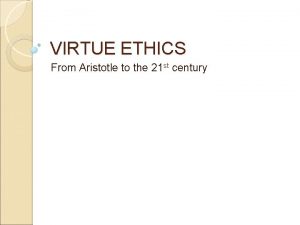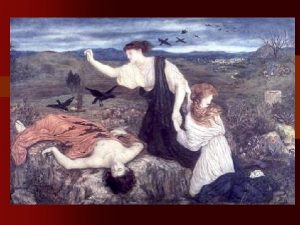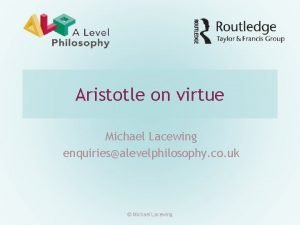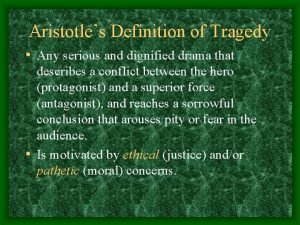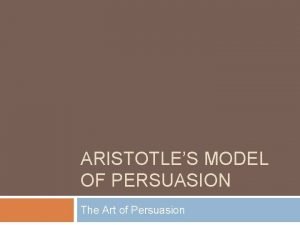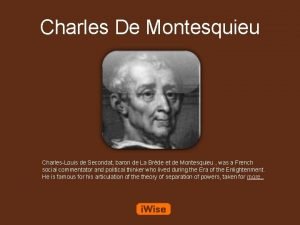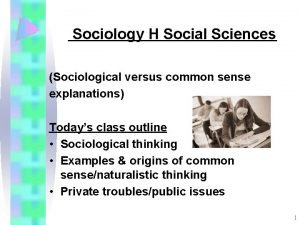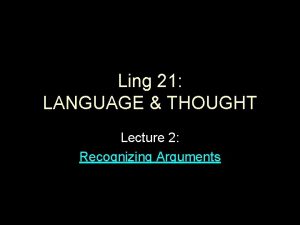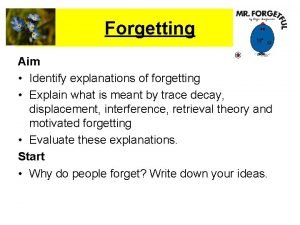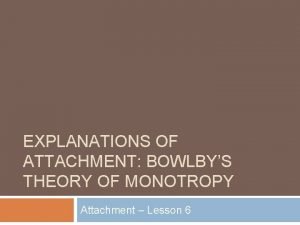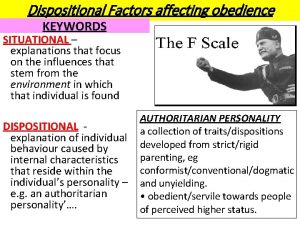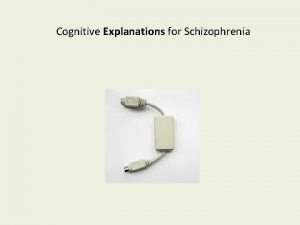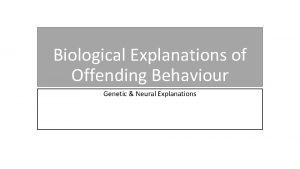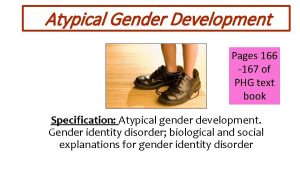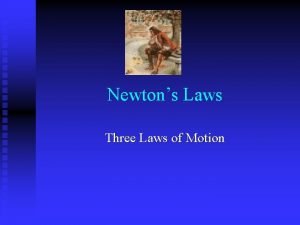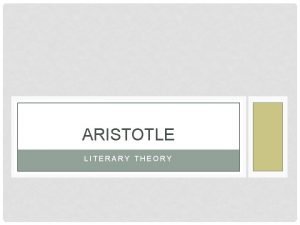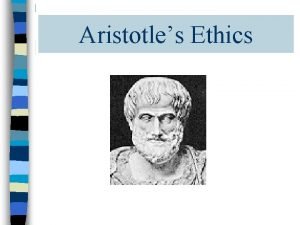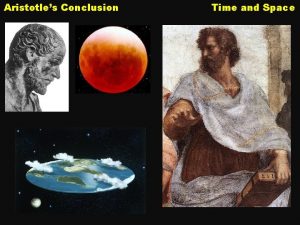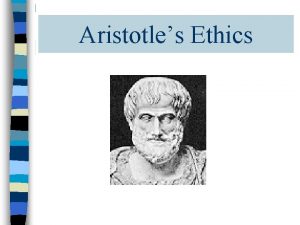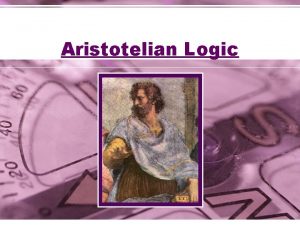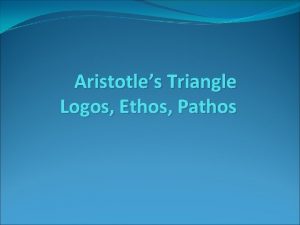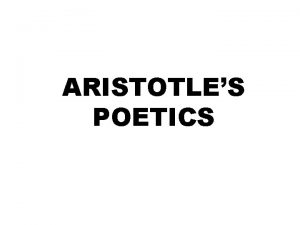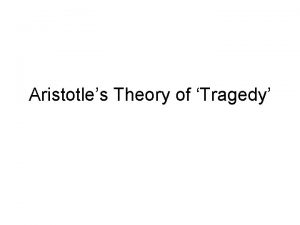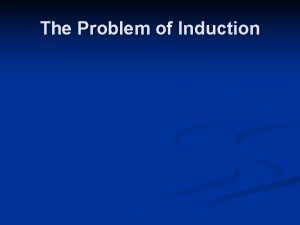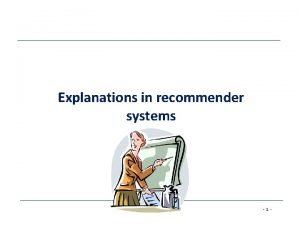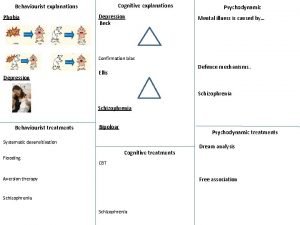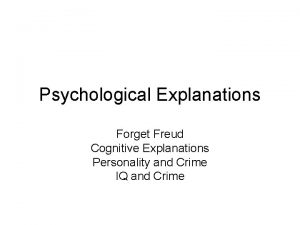Laws of Nature Aristotles Explanations n Aristotles structure




















- Slides: 20

Laws of Nature

Aristotle’s Explanations n Aristotle’s structure of knowledge consisted of explanations such as: Statue is Bronze is Brown Statue is Brown n Inductions gave us fundamental middle terms for these explanations

Aristotle’s Explanations n Aristotle thought there were 4 types of explanation depending on the type of ‘cause’ Formal (statue has legs … it’s the image of a man) n Material (it’s brown … it’s bronze) n Final (it was made … it honours Pericles) n Effective (it looks like a man … it’s from a mould) n n We thought that only this sort of cause was interesting to science

Aristotle’s Explanations n Aristotle’s example of an efficient cause Why is the child ugly? n Because the father is ugly n The father is ugly An ugly father will have an ugly child The child is ugly n The middle premiss looks like a ‘law of nature’

Aristotle’s Explanations n Laws of Nature An ugly father will have an ugly child n A hockey stick dipped into water will appear to bend n A dropped cannonball will accelerate as it falls n One billiard ball hitting another will make it move n n These are causal relations n Identified by induction on particular observations?

Hume on Causes n What’s the relationship between those two billiard balls? Event 1: BB 1 strikes BB 2 n Event 2: BB 2 moves away from BB 1 n Event 1 follows Event 2 n n We say Event 1 causes Event 2 There is some power in E 1 that brings about E 2 n There is some necessary link between E 1 and E 2 n

Hume on Causes n Why do we say there is such a necessary link? Because we have seen those sorts of events many times n They have always been in that time order n There has always been that sort of immediacy n n We conclude by induction that n Any object striking another is followed by the other moving away

Hume on Causes n This does not give us the idea of a ‘necessary’ link or a ‘power’ We only see a ‘constant conjunction’ of events n That is all that causal talk can really refer to n n The idea of ‘necessity’ and ‘power’ is a trick of the mind It arises from the constant movement from ideas of one event to ideas of the other n It’s a track worn in the mind by repetition n

Trouble with Hume on Causes n Is there no difference between ‘accidental’ constant conjunctions and ‘causal’ relationships? When I leave the lights on in my car the battery goes flat n When I invite people to a BBQ it rains n The first tells me something about the world; the second really doesn’t n What makes the first a Law of Nature and the second not? n

Mackie on Inductive Support n Instances of accidental uniformities don’t give inductive support for a possible regularity, whereas instances of a Law of Nature do n That certainly seems to capture our attitude to them n We do think that given previous battery examples we can conclude that it will also go flat next time we leave things on n We don’t really think that previous BBQ examples justify concluding that next time it will also rain

Mackie on Inductive Support n Instances of accidental uniformities don’t give inductive support for a possible regularity, whereas instances of a Law of Nature do n That certainly seems to capture our attitude to them n But this doesn’t explain how we have these intuitions or justify them n C. f. Goodman’s solution to his New Problem of Induction: n n The predicates for which induction works are projectible Projectible predicates are the ones for which induction

The System Solution n Look at Science as a system of deductions which aims to express all the truths about the world n There are two virtues: n Simplicity: Science could minimise the axioms and derive as much as possible by deduction n Strength: Science could just include all true statements (including what we think of as accidents) n Try to find the system that is optimal with respect to strength and simplicity

The System Solution n Laws of Nature all and only the general statements that appear in all the best systems Thus battery draining is derivable from generalities about electrons, currents, etc. in all the best systems n BBQ rainouts are not derivable from axioms that appear in all the best systems n

The System Solution n Are these really significant virtues? Simplicity: are law of natures dependent upon our intellectual capacities? n Do aliens with minds not made like ours live in a universe with different laws of nature? n

Against Hume n Hume showed that we couldn’t derive our concept of cause by induction. And therefore not from observation at all n And therefore it’s an unsupported concept n

Against Hume n Two problems 1. Hume is interested in a psychological theory of how concepts can arise. We’re not. n If we can accept that we have a concept of necessity then the problem is not how to generate it, but how to apply it to statements of regularities n We do have a concept of necessity for maths, ethics, habits, etc.

Against Hume n Two problems 2. Hume is theoretically committed to enumerative induction. We’re not. n We can appeal to an Inference to Best Explanation Phenomenon C is observed A explains C and does so better than any rival explanation ------------------------------------A n This is clearly an inductive argument, and a common one

Against Hume You return home to find your door broken and some valuable items missing. Possible explanations include: 1. A meteorite struck your door and vaporised your valuables. 2. Friends are playing a joke on you. 3. A police Tactical Response Group entered your house 4. You were robbed. Explanation 4 seems the best, so you conclude -------------------------------------You were robbed.

Against Hume Object A striking object B is followed by B moving off Object C striking object D is followed by D moving off … Object Y striking object Z is followed by Z moving off These observations could be explained if the event of an object of a certain type striking another object of that type was necessarily connected to the event of the second object moving off. This is the best explanation on offer for those observations ------------------------------------------The event of an object of a certain type striking another object of that type is necessarily connected to the event of the second object moving off.

Against Hume n On the other hand just saying causation is this sort of necessary connection doesn’t really get us very far What is this necessity? n We still don’t have an explanation for causation n n And therefore we still don’t have a good criterion for identifying laws of nature
 Nature and nature's law lay hid in night meaning
Nature and nature's law lay hid in night meaning Aristotle virtues
Aristotle virtues The definition of tragic hero
The definition of tragic hero Aristotle virtues
Aristotle virtues Aristotles unities
Aristotles unities Megalopsychia tragedy definition
Megalopsychia tragedy definition Concept of tragedy by aristotle
Concept of tragedy by aristotle Aristotles model
Aristotles model Aristotle's poetics tragic hero
Aristotle's poetics tragic hero Charles de secondat
Charles de secondat Common sense and sociological explanations
Common sense and sociological explanations Premise indicators
Premise indicators Motivational forgetting
Motivational forgetting Monotropy definition
Monotropy definition Situational factors affecting obedience
Situational factors affecting obedience Cognitive explanations of schizophrenia
Cognitive explanations of schizophrenia Dust bowl migration map
Dust bowl migration map Russian revolution cartoon
Russian revolution cartoon Evaluate the atavistic form explanation for offending
Evaluate the atavistic form explanation for offending Neural explanations of offending behaviour
Neural explanations of offending behaviour Gender dysphoria biological explanations
Gender dysphoria biological explanations

